PROXY MONITOR 2013
FINDING 5
2013 Proxy Season Review
More proposals have been introduced in 2013, but fewer have gained majority support.
ABOUT PROXY MONITOR
The Manhattan Institute’s ProxyMonitor.org database, launched in 2011, is the first publicly available database cataloging shareholder proposals and Dodd-Frank-mandated[1] executive-compensation advisory votes at America’s largest companies. This is the 19th in a series of findings and reports drawing upon information in the database, each of which examines shareholder activism in which investors attempt to influence corporate management through the shareholder voting process.[2] |
Corporate America’s “proxy season” has now wrapped up: most of America’s large publicly traded companies hold annual meetings to vote on business, including shareholder proposals, between April 15 and the end of June. Among the 250 largest U.S. public companies by revenues that constitute the Manhattan Institute’s ProxyMonitor.org database, 214 had held meetings by July 1.[3]
In 2013, companies faced more shareholder proposals, on average, than in 2012, but the average support for proposals fell and a smaller percentage of proposals received the support of a majority of shareholders. The most commonly introduced type of proposal, as in 2012, involved companies’ political spending or lobbying; but as in 2012, none of these proposals passed, and shareholder support for this class of proposals held steady at a modest 18 percent.
This finding discusses these results in more detail. First, the finding summarizes 2013 shareholder proposals, including their rate of introduction and a breakdown of shareholder proposal types and shareholder proposal sponsorship. Next, the proposal examines voting results, Finally, the proposal looks in more depth at the most common class of proposal: that involving political spending or lobbying.
Summary of 2013 Shareholder Proposals
The 218 Fortune 250 companies filing 2013 proxy statements with the federal Securities and Exchange Commission (SEC) by July 9 faced 278 proposals introduced by shareholders, on average 1.28 per company, up from 1.21 per company in all of 2012. This increase is substantially driven by an increase in proposals related to executive compensation, which have accounted for 21 percent of all shareholder proposals in 2013, up from 16 percent in 2012. The percentage of proposals related to executive compensation is still significantly below that witnessed from 2006 through 2010, which was 27 percent; over one-third of compensation-related proposals in the earlier period sought shareholder advisory votes on executive compensation (“say on pay” votes), which are now mandatory for all public companies—thus obviating the need for shareholders supporting the idea to introduce such proposals.
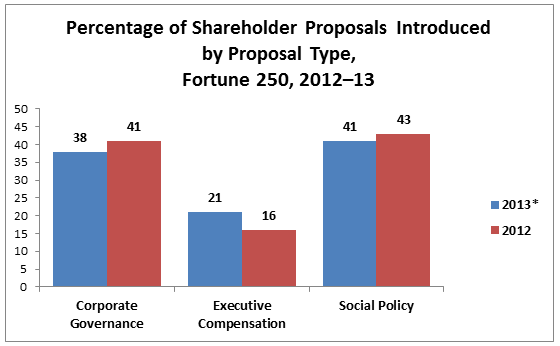
The increase in executive-compensation-related shareholder proposals is not being driven by proposals related by equity compensation, the fourth-most-introduced proposal type in both 2013 and the full 2006–13 period: such proposals constitute 11 percent of all proposals introduced this year, down marginally from 12 percent in 2012. However, other executive-compensation-related proposals—including those related to senior executive death benefits and change-in-control equity awards—have jumped from 4 percent to 9 percent of all proposals, year over year. As mandatory say-on-pay votes entered their third year, it appears that shareholders interested in executive-compensation issues are seeking new approaches to modifying senior management’s pay.
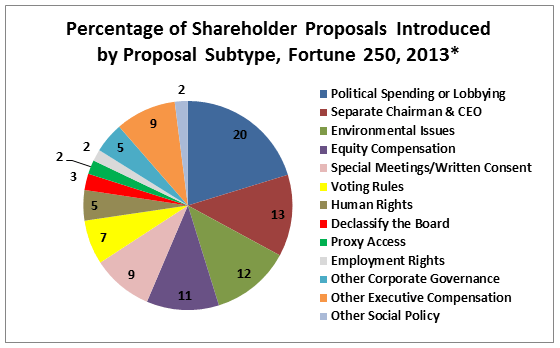
Shareholder proposals related to political spending or lobbying have been introduced more often than any other proposal type in 2013, constituting 20 percent of all proposals, up marginally from 19 percent in 2012. Other commonly introduced proposals include those seeking to separate the positions of chairman and chief executive officer (CEO), which have constituted 13 percent of all proposals (the same share as in 2012); and those involving the environment, which have accounted for 12 percent of proposals introduced (up from 10 percent in 2012).
The share of proposals seeking to modify shareholder voting rules (typically to require that directors standing for election receive a majority of votes, rather than a plurality) fell from 11 percent in 2012 to 7 percent in 2013. The share of proposals seeking to declassify the company’s board of directors—to require that a company elect all directors annually, rather than staggering elections with directors serving multiyear terms—also fell from 4 percent to 3 percent. The drop in majority-voting and board-declassification proposals is significant because these two types of proposals are historically more likely to receive majority shareholder backing than any other. In part, the drop in the number of such proposals introduced is explained by majority voting and annual board elections being adopted by an increasing percentage of America’s largest companies.
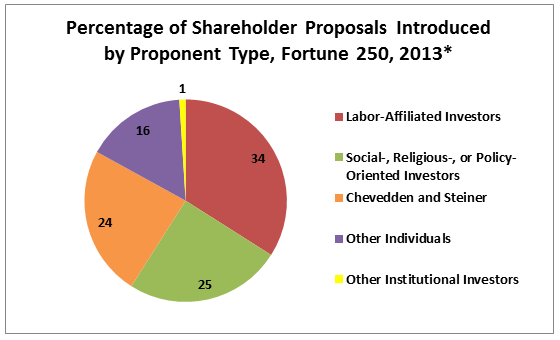
In keeping with historical norms, shareholder proposals in 2013 have been introduced by a small subset of investors: institutional investors affiliated with organized labor (chiefly pension funds responsible for union workers’ employee benefits, including state and municipal pension funds); institutional investors with an express “social investing” purpose or affiliated with a religious or public-policy group; and a small number of individual “corporate gadflies”[4] who repeatedly file common classes of proposals at multiple companies. Labor-affiliated investors have introduced over one-third of all shareholder proposals in 2013, and social-, religious-, and policy-oriented investors one-quarter. Some 24 percent of all proposals were introduced by just two gadflies, John Chevedden and Kenneth Steiner, and their relatives and family trusts. Among the 16 percent of proposals introduced by other individuals, 43 percent were introduced by two more gadflies, James McRitchie and Gerald Armstrong, or by socially oriented investor John Harrington, manager of the social-investing fund Harrington Investments. As was the case in 2012 and throughout the 2006–13 period, only 1 percent of shareholder proposals in 2013 were introduced by shareholders without a tie to organized labor or a social, religious, or policy purpose.
Voting Results
Shareholder proposals have been less likely to gain shareholder support in 2013 than in 2012. Among the 260 shareholder proposals voted on by July 1, 2013, at Fortune 250 companies’ annual meetings,[5] only 7 percent (17 proposals) received the backing of a majority of shareholders, as compared with 9 percent (27 of 294 proposals) in all of 2012. Shareholder proposals introduced in 2013, on average, have received the support of 25 percent of shareholders, down from 27 percent in 2012.
Among those proposals coming to a vote and receiving majority backing:
- Seven sought majority-voting requirements for director elections, of 12 introduced;
- Six sought to declassify the company’s board, of seven introduced;
- Two sought “proxy access” (the right for owners of a certain percentage of a company’s stock to nominate directors on the company’s proxy ballot), of six introduced;
- One sought to permit shareholders to act outside annual meetings by written consent, of 19 introduced; and
- One sought to separate the company’s chairman and CEO positions, of 33 introduced.
Given that almost all shareholder proposals to receive majority support involved majority voting or board declassification, the decline in the number of such proposals being introduced in 2013 largely explains the drop in the overall share of proposals passing.
Among the 200 Fortune 250 companies to have held executive-compensation advisory votes in 2013,[6] only two—Navigant and Apache—failed to receive majority support from shareholders. In comparison, shareholders voted against management pay at five of 232 companies holding executive-compensation advisory votes in 2012. The share of Fortune 250 companies receiving under 70 percent support in say-on-pay votes held constant year over year, at 9.5 percent. This continuity, combined with the drop in votes of under 50 percent, suggests that in 2013, management being targeted by shareholders or flagged by proxy advisory firms over pay practices were better able to persuade marginal shareholders to support their compensation packages.
Special Focus: Political Spending
In recent years, particularly since the Supreme Court’s 2010 Citizens United decision that corporate political spending was free speech protected by the First Amendment,[7] an increasing share of shareholder proposals at America’s largest companies have involved corporate political spending or lobbying. In 2012, for the first time, this class of proposals constituted a plurality of all shareholder proposals introduced. In 2013, again, political-spending- and lobbying-related proposals have been introduced more frequently than any other proposal type—20 percent of all proposals to make proxy ballots this year, up marginally from 19 percent in 2012.
Proposal composition. While the rate of introduction of political spending or lobbying proposals has remained relatively constant, the composition of such proposals has shifted. In 2012, only one-third of 57 such proposals involved lobbying, but 54 percent of the 56 proposals introduced to date in 2013 have had a significant lobbying focus.
The decrease in the number of shareholder proposals related exclusively to political spending is mostly accounted for by a drop in the number of disclosure-related proposals approximating the “model shareholder resolution” promulgated by the Center for Political Accountability (CPA),[8] a group formed by former Democratic congressional staffer Bruce Freed “to bring transparency and accountability to corporate political spending.”[9] In 2013, only 14 Fortune 250 companies have faced CPA-style proposals, down from 25 in 2012. In contrast, there have been 12 non-CPA-style shareholder proposals related to political spending but not lobbying introduced in 2013, versus 13 in 2012. The overall 32 percent decline in the number of proposals related to political spending but not lobbying and the 44 percent drop in CPA-style proposals may be attributable in part to the fact that 2012 was a presidential election year. Moreover, the 2013 drop in the number of CPA-model proposals may be due in part to corporate decisions to increase certain disclosures in response to Freed’s and certain shareholder activists’ efforts.
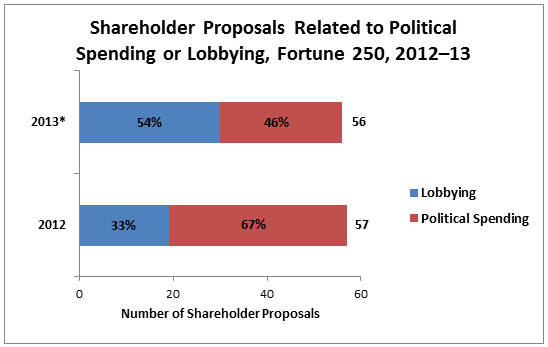
Proposal sponsorship. A majority of all political spending and lobbying proposals in 2013 were introduced by investors with a social, religious, or policy orientation. (Some 54 percent of those came from social-investing funds, 36 percent from religious organizations, and 10 percent from public-policy organizations or charitable trusts with a social-investing orientation.) Over one-third of proposals related to political spending or lobbying were introduced by investors affiliated with organized labor.
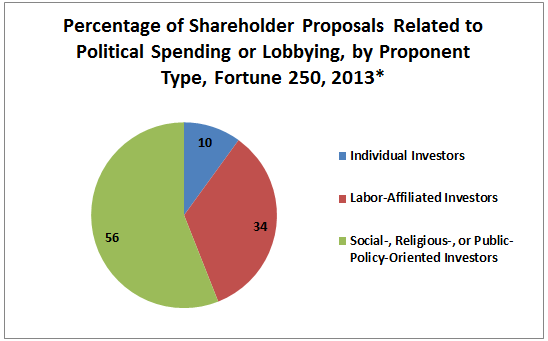
The most active sponsor of political-spending-related proposals was the New York State Common Retirement Fund, which holds assets in trust for the New York State & Local Retirement System (NYSLRS).[10] As discussed in previous findings, the sole fiduciary of the New York pension fund is the state’s elected comptroller,[11] currently Democrat Thomas P. DiNapoli. In addition to sponsoring six CPA-style proposals and two that also relate to lobbying, DiNapoli, in his capacity as comptroller, sued the company Qualcomm in Delaware state court, seeking to obtain the company’s records related to political spending.[12] The suit settled, with the company agreeing to certain disclosures, on February 22.[13]
Other active sponsors of political spending and lobbying proposals have been the social-investing fund Northstar Asset Management; the pension fund for the public-employee union American Federation of State, County, and Municipal Employees (AFSCME); and the Sisters of St. Francis, a Catholic order of nuns. (Nine of the ten shareholder proposals related to political spending or lobbying that were backed by religious groups came from Catholic religious orders.)
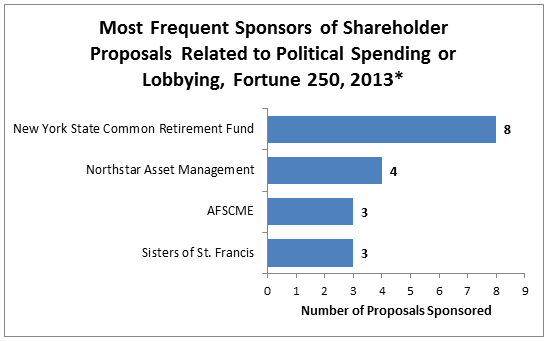
Voting results. Proposals related to political spending or lobbying continue to receive relatively modest support from shareholders: proposals in this class, on average, received support from only 18 percent of shareholders in 2013, unchanged from 2012. Moreover, the average support for shareholder proposals relating to political spending but not lobbying fell from 17 percent to 16 percent year over year, and the support for proposals relating to lobbying dropped from 22 percent to 20 percent. Thus, the support for this class of proposals overall appears to be falling, a trend masked by the greater share of 2013 proposals related to lobbying, which tend to attract marginally more shareholder support than those devoted purely to political spending.
The average shareholder vote for CPA-style proposals rose slightly, from 23 percent in 2012 to 25 percent in 2013. This increase is significantly explained by the 41 percent support given to a CPA-style proposal at Hess, which faced a proxy fight from the hedge fund Elliott Associates.[14] In its effort to accumulate voting proxies for its own slate of directors, Elliott backed all shareholder proposals.[15] Outside the vote at Hess, no other political-spending- or lobbying-related proposal has received over 40 percent of the shareholder vote in 2013.
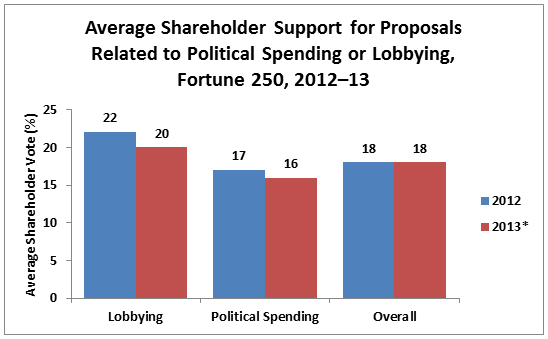
Analysis. Government- and church-affiliated pension plans are exempt from the federal requirement, under the Employee Retirement Income Security Act (ERISA),[16] that fund managers “consider only those factors that relate to the economic value of the plan’s investment.”[17] ERISA strictures against “subordinat[ing] the interests of the participants and beneficiaries in their retirement income to unrelated objectives”[18] would apply, however, to other union-related pension plans, including AFSCME’s. Given the body of evidence suggesting that corporate political spending and lobbying, on average, are associated with higher shareholder returns, these funds would be well-advised to rethink their focus on this issue. Unions in general, and public-employee unions in particular, have an obvious vested interest in the political process beyond their interests as pension investors—to say nothing of partisan elected officials such as Thomas DiNapoli.
ENDNOTES
- Pub. L. No. 111-203, 124 Stat. 1376, §951 (2010) [hereinafter Dodd-Frank Act].
- See Proxy Monitor, Reports and Findings, http://proxymonitor.org/Forms/reports_findings.aspx (last visited July 12, 2013).
- Four more companies—Freeport- McMoRan, SUPERVALU, McKesson, and Computer Sciences—have filed proxy documents with the Securities and Exchange Commission for meetings in the latter half of July or in August.
- “Corporate Gadflies” as commonly used in Charles M. Yablon, Overcompensating: The Corporate Lawyer and Executive Pay, 92 Colum. L. Rev. 1867, 1895 (1992); Jessica Holzer, Firms Try New Tack against Gadflies, Wall. St. J., Jun. 6, 2011, http://online.wsj.com/article/SB10001424052702304906004576367133865305262.html.
- Not every shareholder proposal on proxy statements receives a vote at the annual meeting, as some proposals are withdrawn after negotiations between management and the proposal sponsor. In other cases, the proponent or proponent’s named agent doesn’t appear at the meeting to introduce the proposal, in which case the company isn’t required under SEC proxy rules to allow voting on that item.
- Not all companies hold annual votes on compensation, as Dodd-Frank permits companies to hold such votes annually, biennially, or triennially, as determined by shareholder vote every six years, and as approved by the board of directors.
- See Citizens United v. FEC, 130 S. Ct. 876, 882-885 (2010).
- Center for Political Accountability, Political Disclosure and Oversight Resolution 2013, http://www.politicalaccountability.net/index.php?ht=d/sp/i/867/pid/867 (last visited July 12, 2013).
- Center for Political Accountability, About the CPA, http://www.politicalaccountability.net/index.php?ht=d/sp/i/870/pid/870/pid/190 (last visited July 12, 2013).
- Office of the State Comptroller, New York State and Local Retirement System, http://www.osc.state.ny.us/retire/index.php (last visited July 12, 2013); see Office of the State Comptroller, Snapshot of the New York State Common Retirement Fund, http://www.osc.state.ny.us/pension/snapshot.htm (last visited July 19, 2013).
- Office of the State Comptroller, Fiduciary Responsibilities of the Comptroller, http://www.osc.state.ny.us/pension/fiduciary.htm (last visited May 22, 2013).
- James Copland, Political Spending, Say on Pay, and Other Key Issues to Watch in the 2013 Proxy Season (Manhattan Inst. for Pol’y Res., Winter 2013), http://www.proxymonitor.org/Forms/pmr_05.aspx.
- Dan Strumpf, Qualcomm Settles Disclosure Suit with New York, WALL ST. J. (Feb. 22, 2013), available at http://online.wsj.com/article/SB10001424127887323549204578320500077425818.html.
- Elliott founder and principal Paul Singer is the chairman of the Manhattan Institute for Policy Research but has had no involvement with the preparation of this report. See Hess Corporation, Definitive Proxy Statement Pursuant to Section 14(a) of the Securities Exchange Act of 1934, proposal 7 (2013), available at http://www.sec.gov/Archives/edgar/data/4447/000119312513119720/d475998ddefc14a.htm#edgtoc475998_17.
- Hess Corporation, Elliott Associates Filing: Proxy Statement Pursuant to Section 14(a) of the Securities Exchange Act of 1934, available at http://www.sec.gov/Archives/edgar/data/4447/000104746913003863/a2214221zdefc14a.htm.
- Pub. L. No. 93-406, § 514, 88 Stat. 829, 897 (1974) (codified at 29 U.S.C. §§ 1001-1461 (2006)).
- See 29 C.F.R. § 2509.08-2(1) (2008) [hereinafter 29 C.F.R.]; see also 29 U.S.C. §§ 1003(b).
- See 29 C.F.R., supra note 17.
- See Robert J. Shapiro & Douglas Dowson, Corporate Political Spending: Why the New Critics Are Wrong, Legal Pol’y Rep. No. 15, 22 (Manhattan Inst. for Pol’y Res., 2012), available at http://www.manhattan-institute.org/html/lpr_15.htm.